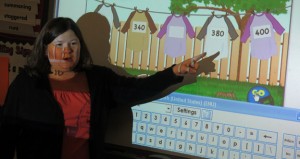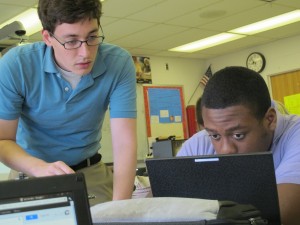Why Everyone's Fighting About Who's Qualified To Teach In Indiana
Teacher licensure isn’t just another education issue for Noblesville parent Jeff Huffman.
His son Nash, 11, has Down syndrome. Jeff has made sure, though, that Nash spends most of his school day in a general education classroom. For each staff member involved in Nash’s education — every teacher, every paraprofessional, every aide — Huffman says he asks the school what teaching license they carry. For him, it’s part of being involved as a parent.
But changes to Indiana’s teacher licensure rules are in the works, and the already-complex process has become particularly contentious.
The debate has pitted the education officials (charged with writing the new regulations) against the colleges and universities training new teachers in Indiana.
As a parent watching the arguments, Huffman says he feels caught in the middle.
—Dale Chu, Assistant Superintendent, IDOE
“This licensure piece is just like every single other thing in our political environment today. Everybody’s got their feet in the cement on their side of the issue,” Huffman says.
In fact, the debate has been so bruising that at least one special education advocacy group — one of which Huffman is a part — says it will watch this fight from the sidelines.
Who’s Riled Up & Why
Officials at the Indiana Department of Education proposed the changes to the state’s teacher licensure guidelines earlier this year. The new language — known as the revised Rules for Educator Preparation and Accountability, or “REPA II” — hasn’t been adopted yet. In fact, the State Board of Education is still accepting public comment on the new language until Friday at midnight.
It’s a very technical process, and the proposed changes are far-reaching. But there are three changes that make Gerardo Gonzalez, Dean of Indiana University’s School of Education, particularly edgy:
- Leaving the back door open? The new guidelines would allow anyone who’s obtained any Bachelors degree with better than a 3.0 GPA — even in a field other than education — to take a knowledge exam for a particular content area. If they passed, they would earn an “adjunct permit,” a de facto license allowing them to hold a teaching job. If they can earn “effective” ratings under the state’s teacher evaluation model, they can continue teaching. If they can’t earn those ratings, they’d lose the five-year permit.
- ‘Testing in.’ Under REPA II, any teacher certified to teach in one subject could become licensed to teach in another subject by taking a content exam. (Indiana teachers hold content area licenses in subjects ranging from English to social studies to technology education.)
- MA’s for administrators. Principals and building-level administrators would not be required to hold master’s degrees under the changed rules.
“It’s really an across-the-board lowering of standards,” Gonzalez says, adding:
What this does is essentially open up the door for anyone [to enter teaching]. Yes, they might be someone who can learn on the job, be mentored, eventually take some courses, and be successful. Doesn’t mean that everyone will be able to do that. We know from research that two bad teachers in a row can make a whole lifetime of difference in student achievement.
The proposal has also garnered similar criticisms from the Indiana State Teachers Association, the Indiana Music Educators Association, and in newspaper op-eds.
Dale Chu, Assistant Superintendent at the Indiana Department of Education, says those who oppose the change are “conflating” teacher licensing with the schools’ hiring processes. School districts are still likely to hire traditionally well-qualified teachers, Chu says.
“Just because our aim is to provide greater flexibility, we’re focusing more on results now with regard to licensing of teachers, that does not mean all of a sudden ‘the floodgates are going to open,” Chu says.
—Jeff Huffman, Noblesville parent
But, Chu continues, districts need the flexibility to consider job candidates who would work well in the classroom, even if they don’t have education degrees. And, state officials add, the tests non-traditional applicants would be required to pass to get a license would require comprehensive knowledge of the subject area.
On a broader level, state officials point to policy changes — such as mandatory teacher evaluations — for which they say the colleges of education aren’t preparing graduates well.
“We have more tools to use to help students learn and make teachers better. And we want our schools of ed to start using those tools,” IDOE spokesperson Stephanie Sample told StateImpact in March.
Gonzalez doesn’t appreciate the suggestion IU isn’t preparing educators for the classroom. He says he hears more stories of teachers succeeding in spite of state regulations than with the assistance of state regulations.

Kyle Stokes / StateImpact Indiana
A teacher at East Side Intermediate School in Anderson instructs students about patterns.
“We have a lot more evidence that our graduates are performing at high levels than they have that our graduates are not performing well,” Gonzalez said, pointing to an IU School of Education white paper showing students taught by education majors score better on national reading and math tests.
The View From The Sidelines
Parent Jeff Huffman says both the IDOE and the schools of education have valid points. On one hand, he tells StateImpact formal schooling must play a role in preparing a prospective teacher for the classroom.
I’m in no way even coming close to saying that I’m a teacher or qualified to be a teacher. It’s taking that curriculum and that skill-set and modifying that curriculum into a way that, not only students of special education, but all students can comprehend and learn from is a pretty unique skill-set. And you’ve got to have some of that training to do that.
But Huffman says many Indiana teachers are being allowed to teach special education with emergency waivers, essentially a stopgap measure letting currently-licensed educators cover a shortage of special education teachers. He says it makes little sense for state officials to advocate for an “adjunct permit” to allow prospective teachers who aren’t licensed to take special education jobs.
Most of the state’s schools of education offer alternative programs for those who wish to transition into teaching from another field. Some of these programs require a full year of student teaching. Others require no student teaching.
On the other hand, Huffman says the state should open some avenues into the profession for non-traditional teaching candidates. Picture, for example, a lawyer, a doctor, or an engineer for Eli Lilly, Huffman says. He wonders, should they really have to go back to school to become a teacher?
Someone who’s been successful in life and in their career should get some credit for that because they’ve had to deal with a lot of the things that the education world is saying you need to learn. I would also challenge to the education world to confirm to me that when someone comes out of their program, that they would define them as a highly-qualified teacher, guaranteed to be successful.
But The Arc of Indiana, an advocacy group for children with disabilities and their families, has declined to adopt an opinion on the new guidelines, saying the state and the schools of education aren’t debating the changes with students in mind.
(Though Jeff Huffman is on The Arc of Indiana’s education committee, he spoke to StateImpact representing his interests as a parent, not on behalf of the group.)
“Our stance has been neither position, the state’s position nor the university’s position, has been about the education of the student. It’s all about the teachers. And that’s where, unfortunately, education policy falls apart,” says Kim Dodson, The Arc’s associate executive director.
“We don’t think either one of them are right,” Dodson adds. “This conversation doesn’t start with putting students first, and therefore, we think that is unacceptable by both the state and the university.”
For teachers, the fight has been difficult to watch too. IU associate instructor Kharon Grimmet says she disagrees with those who argue an education degree isn’t proper training for a teaching position — and says she feels like teachers aren’t given professional respect.
“People think we’re babysitters,” Grimmet told StateImpact in March. “It’s one thing to stay with a student, or stay with a child, but it’s another thing to make an impact.”
- Listen to our March story on teacher licensure here.
Podcast: Play in new window | Download


